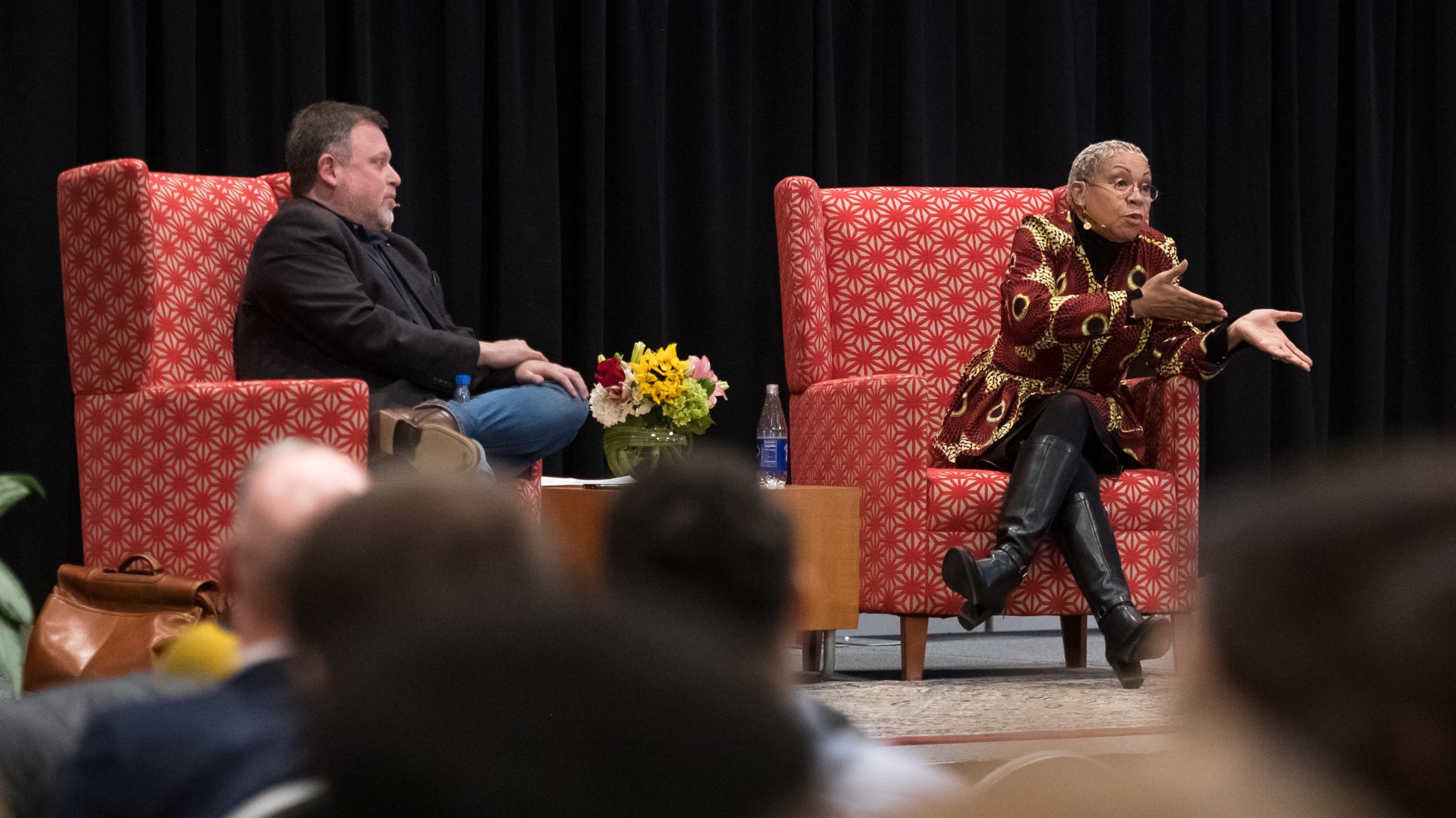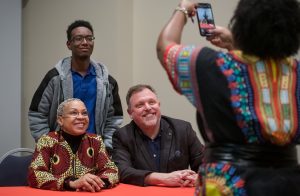
Educators Tim Wise (left) and Joy DeGruy speak to an audience of students, faculty, staff and community guests Feb. 25 during the culmination of the University of Mississippi’s Black History Month observances in the Student Union ballroom. Photo by Megan Wolfe/Ole Miss Digital Imaging Services
OXFORD, Miss. – Students, faculty and staff at the University of Mississippi celebrated the culmination of Black History Month with a conversation Monday night (Feb. 25) that aimed to highlight how marked aspects of America’s history affect the ways that its citizens move forward toward the goals of racial equality and building a diverse community that lifts up all its members – at the university, in Mississippi and across the nation.
Renowned educators and speakers Tim Wise and Joy DeGruy visited the Ole Miss Student Union ballroom to share their research and thoughts on how slavery and white supremacy have shaped American life and how Americans can overcome those entrenched divisions.
“Tonight is a much-welcomed opportunity to stand together and reaffirm our university’s principles of inclusion, diversity and respect for every member of our community,” Interim Chancellor Larry Sparks said before introducing Wise and DeGruy. “Racism, bigotry and hatred run contrary to our values, our principles and our mission to educate.
“Our educational mission and our stewardship of our university calls us to work toward eliminating prejudice and discrimination, and we remain steadfast in our commitment to this goal. We hope that tonight’s events will further our appreciation and understanding of how diversity makes us an outstanding research institution.”
DeGruy, author of several books and a professor of social work, began the discussion by explaining that many aspects of African-American culture can be traced back to an earlier time.
“Part of what I am looking at is a contemporary reality, but I’m trying to understand it in a context you cannot divorce yourself from,” DeGruy said. “So, when people say, ‘How can you see a comparison (to slavery)? How can you see a connection?’ I say ‘How can you not?'”
The negative consequences of slavery and segregation are not exclusive to people of color, said Wise, one of the most prominent writers and speakers on race relations in America.
“It seems to me axiomatic that if trauma does something to the traumatized intergenerationally – which it does – then by definition, it seems to me, there would be a parallel way in which being favored intergenerationally would also have an effect psychologically on the expectations, the behaviors, the value systems of the dominant group,” Wise said about his research.
Students asked questions regarding issues of racial inequality, mental health, and cultural aspects of African-American life and life on a college campus.

Following their Black History Month keynote discussion, Joy DeGruy (left) and Tim Wise meet with UM audience members and sign their books. Photo by Megan Wolfe/Ole Miss Digital Imaging Services
DeGruy and Wise agreed that conversations, such as the one they participated in at Ole Miss, help open avenues to communication and understanding that are critical in building diverse communities and cooperation. DeGruy admitted that sometimes those conversations are the most difficult.
“We are not dealing with the issue of racism in this country, and what it’s done is metastasize, and it’s growing into this big ugly thing that’s getting out of hand, because we are unwilling to face that reality,” she said. “You can’t heal what you don’t understand. We cannot begin to do this without telling the truth, and sometimes the truth doesn’t feel good to people.
“I think it’s really important for us as a people to recognize that (conversation) is good for you. Swallow it, it will be OK, stay in the room. We’ll get through this, but we certainly can’t get through it if everyone is afraid and pensive. We don’t always have to agree on everything, but we do have to stay in the room.”
Disconnect between people of different cultures often provides barriers to productive conversation, DeGruy said.
“We really are connected,” she said. “Human beings are 99.99 percent the same. Humanity really, truly is one.”
Katrina Caldwell, vice chancellor for Diversity and Community Engagement, asked those in attendance to look back on a month of university-sponsored events, such as the Black History Month Kickoff Program, the Black Student Union gala, the Soul Food Luncheon and the Black History Month film, that highlighted the achievements of men and women who fought for civil rights. But she also asked attendees to look ahead and ask themselves what they can do to help move their communities forward.
“Those folks back then, like we are now, were folks who used what they had to make a difference,” she said. “They were like us. Folks who saw their limitations but stood up anyway, and they were folks who envisioned a better life for you and me and your children and my children. … What will you spend the next 337 days doing to contribute to the work that still needs to be done?”
Following the conversation, Wise and DeGruy hosted a brief meet-and-greet with guests, a book signing and a reception.
Sponsors for the university’s 2019 Black History Month observances include the Center for Inclusion and Cross Cultural Engagement, Office of the Chancellor, Office of the Provost, Office of the Vice Chancellor for Diversity and Community Engagement, Office of the Vice Chancellor for Student Affairs, Department of Intercollegiate Athletics, Career Center, University and Public Events, Department of Music, Department of Art and Art History, Oxford Film Festival, Luckyday Scholars Program, Black Student Union, Student Activities Association, UM chapter of the NAACP, Lambda Sigma Chapter of Delta Sigma Theta Sorority Inc., and Xi Zeta Chapter of Sigma Gamma Rho Sorority Inc.